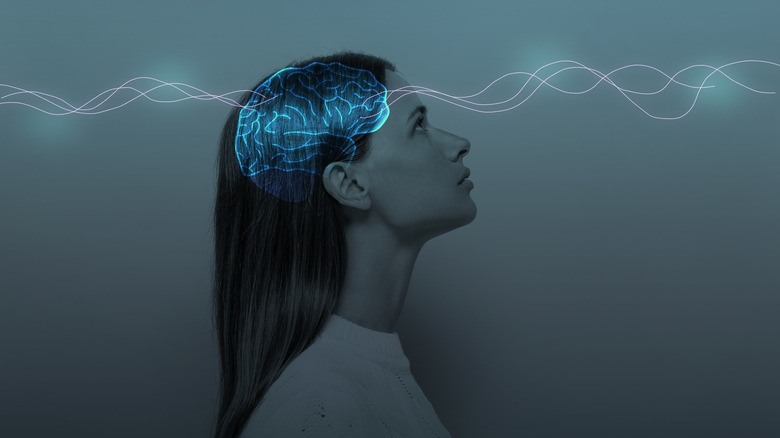The Unexpected Effect Ibuprofen Has On Your Brain Health
Despite the known side effects of ibuprofen — including nausea, headaches, indigestion, and dizziness – nothing has dulled the shine of this nonsteroidal anti-inflammatory drug (NSAID) for many consumers looking for quick pain or fever relief. In fact, Advil (a brand name for ibuprofen) was one of the leading internal analgesic tablets purchased in the U.S. in 2019, per Statista.
And now, according to research done by Vancouver, Canada-based neuroscientists, this popular painkiller might also be able to reduce your risk of developing Alzheimer's (via Science Daily). Dr. Patrick McGeer and his wife, Dr. Edith McGeer, have done previous research on this neurodegenerative disease. They think that it's possible to detect the Alzheimer's-related peptide, Abeta 42, in people's saliva. Abeta 42 deposits in people's brains, leading to an eventual interruption of brain cell communication and neuroinflammation that results in Alzheimer's symptoms like memory loss and behavioral changes, according to their research. The neuroscientists are of the opinion that regular use of ibuprofen could prevent the onset of Alzheimer's in people who have high levels of Abeta 42 in their saliva. Interestingly, this isn't the only study alluding to the unexpected effect ibuprofen has on your brain health.
More research about ibuprofen's impact on brain health
Per 2008 research published in the medical journal of the American Academy of Neurology — Neurology, the inflammation-reducing properties of ibuprofen were linked to reducing the risk of Alzheimer's disease. Scientists analyzed the NSAID use of 49,349 U.S. veterans aged 55 and older who developed this neurodegenerative disease and that of 196,850 veterans without it over a period of five years.
The participants who specifically consumed the NSAID ibuprofen for more than half a decade were found to be 40% less likely to develop this most common type of dementia. There was also an inverse correlation between the risk of developing dementia and the length of ibuprofen use. As study author Dr. Steven Vlad of the Boston University School of Medicine shared (via American Academy of Neurology), "Some of these medications taken long term decrease the risk of Alzheimer's disease, but it's very dependent on the exact drugs used ... One reason ibuprofen may have come out so far ahead is that it is by far the most commonly used."
Despite these findings, there are medical professionals who are concerned about a definite recommendation to take ibuprofen daily to stave off your risk of brain disease. The apprehension has to do with the fact that the studies done so far are population studies and not clinical trials, and the widely-known negative consequences of regular NSAID use.
The concerns with regular ibuprofen use for better brain health
It might be too soon to ask people to buy over-the-counter ibuprofen as a simple precaution against brain degeneration, shared Dr. Doug Brown, chief policy and research officer at the Alzheimer's Society.
According to Tara Spires-Jones, U.K. Dementia Research Institute program lead and deputy director of the Centre for Discovery Brain Sciences, University of Edinburgh, there is also concern with the McGeer study about how exactly ibuprofen is thought to prevent Alzheimer's disease (via Science Media Center). Instead, the professor described the study as "a very preliminary description of a new test for levels of an Alzheimer's related protein in saliva in around 50 people." Per Spires-Jones, more research needs to be conducted "to determine whether this new test is a good predictor of people who will go on to develop Alzheimer's disease."
Also, when you take ibuprofen daily, you run the risk of several adverse consequences, like digestive issues, ulcers, kidney injury, liver injury, bruising and bleeding, and skin rashes, per Harvard Health Publishing. It might be wise to wait and see what else science uncovers about this unexpected connection between brain health and ibuprofen before coming to any definite conclusions.



